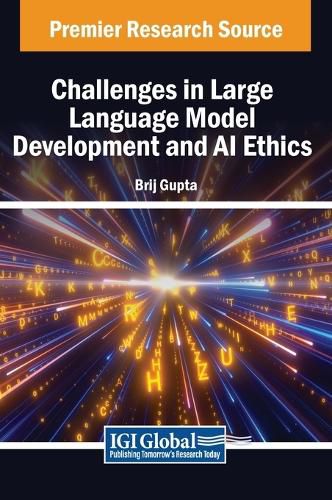Readings Newsletter
Become a Readings Member to make your shopping experience even easier.
Sign in or sign up for free!
You’re not far away from qualifying for FREE standard shipping within Australia
You’ve qualified for FREE standard shipping within Australia
The cart is loading…






This title is printed to order. This book may have been self-published. If so, we cannot guarantee the quality of the content. In the main most books will have gone through the editing process however some may not. We therefore suggest that you be aware of this before ordering this book. If in doubt check either the author or publisher’s details as we are unable to accept any returns unless they are faulty. Please contact us if you have any questions.
The development of large language models has resulted in artificial intelligence advancements promising transformations and benefits across various industries and sectors. However, this progress is not without its challenges. The scale and complexity of these models pose significant technical hurdles, including issues related to bias, transparency, and data privacy. As these models integrate into decision-making processes, ethical concerns about their societal impact, such as potential job displacement or harmful stereotype reinforcement, become more urgent. Addressing these challenges requires a collaborative effort from business owners, computer engineers, policymakers, and sociologists. Fostering effective research for solutions to address AI ethical challenges may ensure that large language model developments benefit society in a positive way. Challenges in Large Language Model Development and AI Ethics addresses complex ethical dilemmas and challenges of the development of large language models and artificial intelligence. It analyzes ethical considerations involved in the design and implementation of large language models, while exploring aspects like bias, accountability, privacy, and social impacts. This book covers topics such as law and policy, model architecture, and machine learning, and is a useful resource for computer engineers, sociologists, policymakers, business owners, academicians, researchers, and scientists.
$9.00 standard shipping within Australia
FREE standard shipping within Australia for orders over $100.00
Express & International shipping calculated at checkout
This title is printed to order. This book may have been self-published. If so, we cannot guarantee the quality of the content. In the main most books will have gone through the editing process however some may not. We therefore suggest that you be aware of this before ordering this book. If in doubt check either the author or publisher’s details as we are unable to accept any returns unless they are faulty. Please contact us if you have any questions.
The development of large language models has resulted in artificial intelligence advancements promising transformations and benefits across various industries and sectors. However, this progress is not without its challenges. The scale and complexity of these models pose significant technical hurdles, including issues related to bias, transparency, and data privacy. As these models integrate into decision-making processes, ethical concerns about their societal impact, such as potential job displacement or harmful stereotype reinforcement, become more urgent. Addressing these challenges requires a collaborative effort from business owners, computer engineers, policymakers, and sociologists. Fostering effective research for solutions to address AI ethical challenges may ensure that large language model developments benefit society in a positive way. Challenges in Large Language Model Development and AI Ethics addresses complex ethical dilemmas and challenges of the development of large language models and artificial intelligence. It analyzes ethical considerations involved in the design and implementation of large language models, while exploring aspects like bias, accountability, privacy, and social impacts. This book covers topics such as law and policy, model architecture, and machine learning, and is a useful resource for computer engineers, sociologists, policymakers, business owners, academicians, researchers, and scientists.